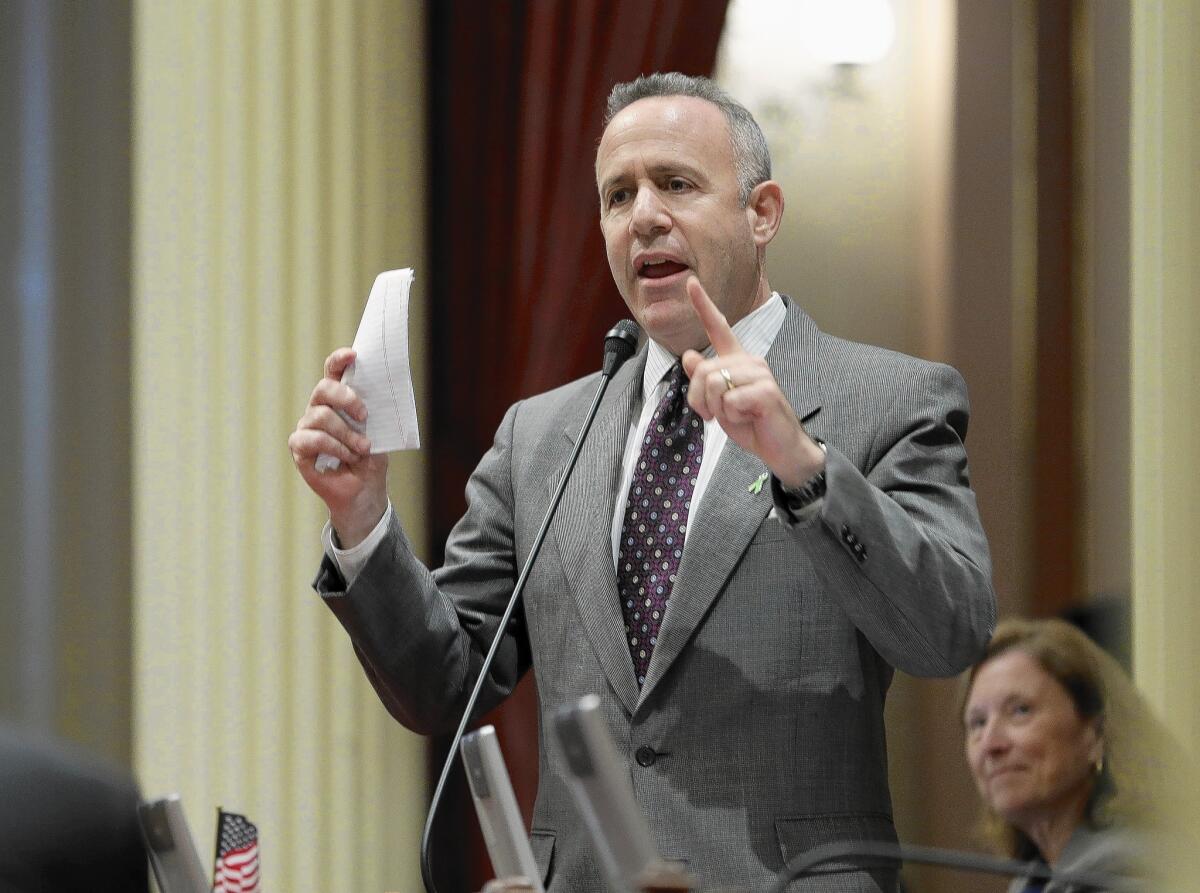Senate chief Steinberg, soon to depart, knows a deal precedes success

- Share via
In SACRAMENTO — Soon-departing state Senate leader Darrell Steinberg is one politician who frankly admits that successful legislating requires aggressive deal making.
It may, at times, look unseemly. But passing important bills doesn’t just happen immaculately.
There’s horse trading, back scratching and offers that can’t be refused. Politicians call it, more politely, “leveraging.”
Steinberg (D-Sacramento) has been one of the more successful leveragers—and one of the better legislative leaders—since California voters adopted ill-conceived term limits 24 years ago, shifting excessive power to the governor and special interests.
All this came to mind recently after Steinberg, 54—generally a good natured man with an upbeat attitude and ready laugh—took slight offense when someone wrote that perhaps his replacement will inspire fellow Democrats to occasionally stand up to Gov. Jerry Brown.
Actually, that someone was me. I quoted Sen. Kevin de León (D-Los Angeles), who takes over as Senate leader in October, as being critical of Brown’s unpopular $68-billion bullet train project. De León said it doesn’t make sense to start laying track in the southern San Joaquin Valley—”in the middle of nowhere…. No one lives out there in the tumbleweeds.”
He added: “We’re going to have to save the governor from himself on high-speed rail.”
Brown promptly called off a meeting he’d scheduled with the next Senate leader on another subject.
Steinberg has been Brown’s staunchest legislative ally on high-speed rail. It wasn’t easy, but last year he secured Senate authorization to spend the initial $8 billion in construction money. A court has held up the spending. This year, Steinberg acquiesced to the governor’s request for $250 million in cap-and-trade money—greenhouse emission fees—to jump-start the train.
Of course, Steinberg finessed even more cap-and-trade funds for his own pet projects: local transit, intercity rail and affordable housing.
“High-speed rail is clearly a high priority for the governor. It was a piece of high leverage that we had. And, yes, we used it to get a ton of things done,” Steinberg told me.
“If we had taken him on on high-speed rail, it would have been bloody and no telling what we’d have gotten.”
Steinberg does have a point. Governors—this one, particularly—hold the high cards: The power to sign or veto bills, appoint people to top jobs, to turn on a loud microphone. And Brown is far more popular with voters than is the Legislature.
Moreover, Steinberg hates gridlock and is a bulldog about getting things done. He’s not one to passively sit back as a spectator and watch others play the game.
It goes back to UC Davis law school, where he became friends with two severely disabled students. He pressed for wheelchair lifts in the moot courtroom. Administrators insisted they didn’t have the money.
Steinberg went to the vice chancellor and was informed the money had been offered, but the law school honchos had rejected it; they didn’t want to mess up the looks of their beautiful new courtroom. Steinberg obtained the rejection letter and got it printed on the front page of the Davis newspaper. Soon the wheelchair lifts were installed.
“That’s where I learned the value of persistence and how to be an advocate,” he recalls. “At graduation—with my parents sitting there—the dean told me, ‘We’re not going to miss you, Mr. Steinberg.’ I took that as a high compliment.”
He adds that from his friends “I learned the flip side of disability: ability.”
Years later, as a Sacramento city councilman, he took up the cause of mental disability when colleagues tried to cut off a Sunday meal program for the homeless, alleging that too many were jamming downtown. The effort “was making Sacramento a laughing stock,” he says.
Not long afterward, Steinberg learned that his young daughter suffered from a severe mood disorder and was diagnosed as bipolar. With treatment, she’s now doing “much better,” he says, and majoring in psychology at a community college.
Steinberg feels “most proud” of his accomplishments on mental health policy, he says. It started with his successful sponsorship of a 2004 ballot initiative, Proposition 63, which imposed a 1% tax on incomes exceeding $1 million to raise money for mental healthcare. This year, it’s generating $1.3 billion.
He also obtained—leveraged—$300 million in last year’s budget for mental health crisis care: beds, specialists, pick-up vans.
When Brown—under a federal court order to ease prison crowding—sought to spend $1.1 billion last year to create more cell space, Steinberg balked. He forced the governor and Assembly Speaker John A. Pérez (D-Los Angeles) to compromise by focusing more on fighting recidivism, emphasizing mental health and substance abuse treatment.
“You have to pick your shots,” Steinberg says. “You have to use some finesse. And you can’t be afraid to publicly say when the governor’s wrong.”
Steinberg’s frequent tactic is to say the governor’s wrong, and then compromise on a mutually beneficial deal.
It tends to drive the governor and his minions nuts, often complaining privately that they can’t keep up with what Steinberg really wants.
But Steinberg keeps winning.
On another top priority—education—he recently obtained $264 million in pre-kindergarten schooling for poor kids and $500 million over two years for a “career pathways” program, what used to be called vocational ed.
For some lawmakers, he’s a little too rambunctious—maybe a bit too ball-hogging, to use a basketball metaphor.
“Only one thing matters in the end,” the Senate leader says. “That is what you get done. The rest is all idle chatter.”
Steinberg has gotten a lot done—for himself, for the governor and for the state. But like democracy generally, it hasn’t always been smooth.
Follow @LATimesskelton for news about state government and politics.
More to Read
Sign up for Essential California
The most important California stories and recommendations in your inbox every morning.
You may occasionally receive promotional content from the Los Angeles Times.














